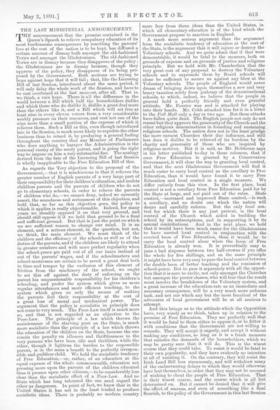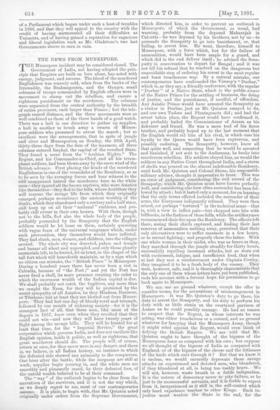THELAST MINISTERIAL ANNOUNCEMENT. T HE announcement that the promise contained in
the Queen's Speech to relieve compulsory education of its most burdensome consequences by remitting the parents' fees at the cost of the nation is to be kept, has diffused a certain amount of dismay both amongst the old-fashioned Tories and amongst the Gladstonians. The old-fashioned Tories are in dismay because they disapprove of the policy ; the G-ladstonians are in dismay because, though they approve of the policy, they disapprove of its being pro- posed by the Government. Both sections are trying to hope against hope that it will fail ; that, like the Licensing Bill of last Session, introduced about the same period, it will only delay the whole work of the Session, and have to be cast overboard at the last moment, after all. That is, we think, a vain hope. There is all the difference in the world between a Bill which half the householders dislike and which those who do dislike it, dislike a great deal more than the others like it, and a Bill which will set free at least nine in every eleven voters from a very considerable weekly pressure on their resources, and cost not one of the nine more than a small portion of the expense of which it relieves them. Such a Bill as this, even though introduced late in the Session, is much more likely to expedite the other business than to retard it, by producing a general feeling throughout the country that any Member of Parliament who does anything to hamper the Administration is the personal enemy of the needy parent, and is going the right way to impose on him a very substantial fine. The analogy derived from the fate of the Licensing Bill of last Session is wholly inapplicable to the Free Education Bill of this.
As regards the Tory objection to the proposal of the Government,—that it is mischievous in that it relieves the greater number of English parents of a very large part of their responsibility for their children's education, and mulcts childless parents and the parents of children who do not go to elementary schools, in order to relieve the parents of children who do,—we cannot deny, indeed we earnestly assert, the soundness and seriousness of this objection, and hold that, so far as this objection goes, the policy to which it applies is really objectionable. Indeed, for many years we steadily opposed it on that very ground, and should still oppose it if we held that ground to be a final and sufficient ground. But that is just the point on which we see sufficient reason to change our mind. It is an element, and a serious element, in the question, but not, we think, the main element. We must think of the children and the efficiency of the schools as well as of the duties of the parents, and if the children are likely to attend in greater numbers and with more perfect regularity when the school-pence ore paid out of all our taxes instead of out of the parents' wages, and if the schoolmasters and school-mistresses are certain to be saved a great deal both in time and temper by the exclusion of this element of friction from the machinery of the school, we ought to set this off against the duty of enforcing on the parent his unquestionable responsibility for his children's schooling, and prefer the system which gives us more regular attendances and more efficient teaching, to the system which gives us only the means of making the parents feel their responsibility at the cost of a great loss of moral and mechanical power. The argument that the policy is socialistic in principle does not come to very much. The Poor-Law itself is much more so, and that is not regarded as an objection to the Poor-Law. The principle of a law which throws the maintenance of the starving poor on the State, is much more socialistic than the principle of a law which throws the education of the children on the State, because the one remits the penalty on idleness and thriftlessness to the very persons who have been idle and thriftless, M hil e the other, though it lightens the burden to the responsible parent, is in the main a benefit to the perfectly irrespon- sible and guiltless child. We hold the socialistic tendency of Free Education,—or, rather, of an education at the equal expense of the whole commonwealth, education not pressing more upon the parents of the children educated than it presses upon other citizens,—to be considerably less clear than the socialistic effect of a Poor-Law. And no State which has long tolerated the one need regard the other as dangerous. In point of fact, we know that in the United States it has not in the least tended to produce socialistic ideas. There is probably no modern country more free from these ideas than the United States, in which all elementary education is of the kind which the Government propose to sanction in England. A much more serious argument than the argument from the socialistic tendency of education at the cost of the State, is the argument that it will injure or destroy the Voluntary schools. And we quite admit that if that were demonstrable, it would be fatal to the measure, both on grounds of expense and on grounds of justice and religious principle. But we hold with Mr. Chamberlain that the very great cost of any proposal to destroy the Voluntary schools and to supersede them by Board schools will alone be sufficient to secure us against any blow at the Voluntary schools. The people of England would never dream of bringing down upon themselves a new and very heavy taxation solely from jealousy of the denominational schools, to which, indeed, we believe that the people in general hold a perfectly friendly and even grateful attitude. Mr. Forster was and is attacked for playing into their hands. Mr. Cobb attacked him for it in a letter to the Pall Mall only a day or two ago. But these attacks have fallen quite dead. The English people not only do not resent but they approve the generosity of the Church and the other religious denominations in founding and sustaining religious schools. The nation does not in the least grudge the more earnest Churches their due influence, and still less does it dislike to be relieved of its burdens by the charity and generosity of those who are inspired by religious motives. But it is said, as Mr. Hobliouse says in his letter published to-day in these columns, that if once Free Education is granted by a Conservative Government, it will clear the way to granting local control, and that the next Gladstonian Government will find it much easier to carry local control as the corollary to Free Education, than it would have found it to carry Free Education and local control in a single measure. We differ entirely from this view. In the first place, local control is not a corollary from Free Education paid for by the State at large, and not paid out of the rates. State control,—increased and improved State control,—is such a corollary, and no doubt one which the nation will desire and carefully enforce. But the only local con- trol for which there is any just pretext, is the local control of the Church which aided in building the school by its subscriptions, and in supporting it by its annual contributions. And in the next place, we hold that it would have been much easier for the Gladstonians to have carried local control in conjunction with the coveted boon of Free Education, than it would be to carry the local control alone when the boon of Free Education is already won. It is proverbially easy to pass a bad sixpence between two half-crowns if you offer the whole for five shillings, and on the same principle it might have been very easy to pass the local control between the double boon of better teaching and the remission of school-pence. But to pass it separately with all the opposi- tion that it is sure to excite, not only amongst the Churches but amongst the poorer classes, who will fear that the result must involve the breakdown of the Voluntary system, and a great increase of the education-rate as an immediate and. necessary consequence, will be a very much more arduous task, and not one which any but the most fanatical of the advocates of local government will be at all anxious to attempt.
And this brings us to the attitude which the Opposition have, very wisely as we think, taken up in relation to the promise of Free Education. They see perfectly well that it would be fatal to them either to oppose it, or to fetter it with conditions that the Government are not willing to concede. They will accept it eagerly, and accept it without making any conditions, so long as it is a frank measure that satisfies the demands of the householders, which we may be pretty sure that it will do. This is the wisest course that they could take. To resist it would be fatal to their own popularity, and they have evidently no intention at all of resisting it. On the contrary, they will resist the Irish Land. Bill less strenuously, and will withdraw many of the embarrassing delays to which they would otherwise have lent themselves, in order that they may not be accused of wishing to cheat the people of Free Education. That is their wisest course, and the course which is all but determined on. But it cannot be denied that it will give the effect of success, and even of something like a final flourish, to the policy of the Government in this last Session of a Parliament which began under such a host of troubles in 1886, and that they will appeal to the country with the credit of having surmounted all their difficulties as Unionists, and of having gained a reputation for sagacious and liberal legislation such as Mr. Gladstone's two last 0-overnments strove to earn in vain.







































 Previous page
Previous page